
It is probably a very good friend right now.
COVID-19 vaccine trials are underway in an unprecedented fashion. But lately, questions about the integrity of Operation Warp Speed have started to linger. A vaccine availability deadline prior to phase 3 data has not helped, and many think that immunity, while feasible, is still distant.
While awaiting proof of vaccine reliance, immune training could act as a stopgap.
The concept of trained immunity is based on how the innate immune system, composed of monocytes, macrophages, and natural killer cells, can display a higher than usual response when they encounter various pathogens other than the ones against which the immune response was initiated. Thus, adding a non-specific partial defense mechanism against many different infectious agents. Simply put, it refers to the ability of the immune system to produce an adequate and early combative response against a pathogen even if it has not been exposed to it in the past.
Immune training appears to occur when various recent vaccinations have left a more activated innate immune system. Much like a revved-up car engine right before the race starts. This is different from adaptive immunity, which forms the basis for vaccination.
Adaptive immunity follows the innate immune response during infection and creates a microbe-specific immune response. Adaptive immunity utilizes T cells and B cells, which eliminates the pathogen and leaves behind memory T cells, which can facilitate a faster immune response if exposure to the same pathogen recurs.
The theory of immune training also has a foundation in how the novel coronavirus behaves in children. There are many plausible expletives about severe infection, or lack thereof, in children. One discusses that exposure to the common cold coronaviruses, which is more common in children, may help develop cross-reacting antibodies resulting in a better ability to fight the novel coronavirus. Another discusses the possible presence of a higher level of bystander immunity due to recent vaccinations in children, and hence their immune systems are better prepared for a quicker antibody response against the novel coronavirus.
Let’s sift through some observations from around the globe.
The BCG vaccine, used for tuberculosis, has historically been shown to decrease 30% infections from various other pathogens within the first year of its administration. A recent interim analysis of the ACTIVATE trial (A randomized Clinical trial for enhanced Trained Immune responses through Bacillus Calmette-Guérin Vaccination to prevent infections of the Elderly) showed a 53% decrease of the incidence of all new infections with BCG vaccination.
Specifically, with respect to COVID-19, an analysis utilizing European data has suggested that for every 10% increase in the degree of universal BCG vaccination deployment in a country, the COVID-19 mortality was reduced by 10.4%. Consequently, multiple trials to assess the prevention of COVID-19 by the BCG vaccine are underway all over the globe. An ongoing American study is addressing the ability of the BCG vaccine in mounting defense against the SARS-CoV2 amongst health care workers.
Researchers have also presented a hypothesis suggesting a potential role of a booster dose of MMR vaccine in the elderly to prevent severe COVID-19 sepsis. MMR is like BCG, as it is a live attenuated (weakened virus) vaccine. It can also theoretically rely on a non-specific ‘innate’ immune response to potentially prevent further unrelated infections from various pathogens. The authors predicted this strategy as a “low-risk-high-reward” attempt because the MMR vaccine does not appear to have significant contraindications barring a few in immunocompromised individuals. Trials undergoing in Canada and Egypt are currently assessing the utility of the MMR vaccine in COVID-19.
Last but not least, the infamous flu vaccine. The inhaled (nasal spray) flu vaccine is a live, weakened virus (like BCG and MMR), and the injectable form is an inactivated or killed virus. It is highly beneficial to receive the flu vaccine in the upcoming months. One simple reason is that America is going into a fall season with one of the highest prevalence of COVID-19 in the world, and the last thing anyone wants is a dual pandemic (twindemic).
Another good reason to avoid getting severe flu is that it’s currently unknown how a recovered flu patient may fare if they would develop COVID-19 infection. I doubt many would want to find out because available evidence suggests that after the flu, there is a reduction in T-cell immune diversity, which could render the patient susceptible to an elevated immune response and hence lead to a higher propensity to develop severe COVID-19.
Not only the flu vaccine would lower the risk of severe flu, it is thought that it could also produce a bystander augmented immune response against COVID-19. Studies have suggested cross-reactivity between immunity against the flu and the coronavirus due to similarity in their structures.
A group from John Hopkins published data from the USA, which correlated area-specific flu vaccine rates in the population more than 65 years of age to COVID-19 deaths. It showed that an incremental use of flu vaccination by 10% correlated with 28% lower COVID-19 deaths. A similar analysis from Brazil suggested 17% lower odds of death in patients who received a recent flu vaccination.
The truth is that we have no choice but to wait cautiously and with optimism for the novel coronavirus vaccine. But skepticism is hard to avoid in a pandemic, which has turned more political with time as it is deadly. Therefore, the least we can do is to protect ourselves against the flu virus and avoid making the lungs more susceptible to any further significant injury.
And just maybe, in the process, train our immune system to fight against other nuances, including the novel coronavirus with all its vigor.
Raghav Gupta is an interventional cardiologist.
Image credit: Shutterstock.com
